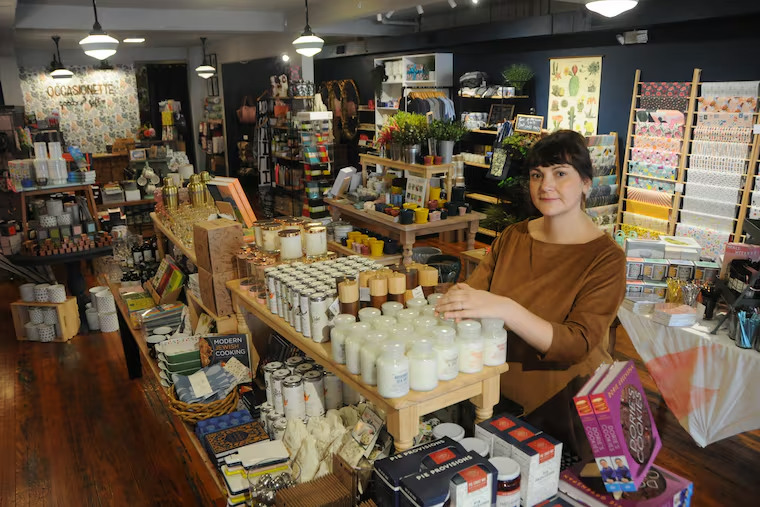How a Philly area retailer finds sales success in physical storefronts
“Retail is not dead: Badly executed, mediocre retail is dead,” said one local retailer.

You won’t convince Sara Villari that brick-and-mortar retail is dead.
“Retail apocalypse” has its own lengthy Wikipedia entry, citing the rise of behemoth box stores, the juggernaut of Amazon, and the ensuing struggles, declines, and bankruptcies among the likes of Sears, J.Crew, Borders, J.C. Penney, Toys R Us, Barney’s, Forever 21 and countless more international and independently owned physical stores.
But, as last year’s Shopping Revolution: How Successful Retailers Win Shoppers in an Era of Endless Disruption by Wharton’s Barbara Kahn, argues, there’s something essential that brick-and-mortar operations have going for them. “It’s the importance of in-store touch and feel,” Kahn told the Knowledge@Wharton podcast.
The impact of an in-person shopping experience is something that Villari, founder and owner of Occasionette, two maker-centric, Main Street gift shops (one in South Philly, one in South Jersey), knows is powerful.
“Retail is not dead: Badly executed, mediocre retail is dead,” said Villari, whose sales tripled from 2016 to 2018, putting her among the ranks of Philly’s 100 fastest growing companies. “What’s not succeeding is when people don’t know what they’re doing, don’t put in the effort, don’t set themselves apart.”
Villari began her career in architecture. Finding less creativity in the field than she craved, in 2006 she started Girls Can Tell, a line of tea towels, tote bags, baby onesies, lunch bags, and more screenprinted with her own, often hometown-referential, illustrations. (Last year, she sold the business to her longtime screen printer, Adam Woods; Occasionette continues to carry the line, including exclusive designs.)
But Villari wasn’t just adept at creating her creations, she was excellent at selling them — especially on Etsy, then a start-up. The e-commerce success of Girls Can Tell led Etsy to hire Villari in 2007 as its teams coordinator. Her job: Teach online vendors how to better market their wares and work together.
At Etsy, Villari both fell in love with working with makers and developed the dangerous retail habit of constant, online comparisons, especially on social media.
“It became emotionally exhausting, comparing my work to other people’s work,” she said. Villari decided she didn’t want to beat her competition. She preferred to join them. Rather, she wanted them to join her.
“I felt if I opened a store and sold other things that other people were making, I could be excited about all the cool stuff that people were making, instead of just comparing myself to them,” she said.
Villari opened Occasionette on Passyunk Avenue in 2013. The 1,000-square-foot shop was first retail in front, Girls-Can-Tell operations in back. Today, the space is 100 percent retail. In 2017, she opened a second, 2,000-square-foot location in Collingswood.
“I started out with two people who worked probably 10 hours a week,” said Villari. “Now, we have 15 or 16 employees, and, at holiday, 20.” Villari also hired an operations manager to focus on the day-to-day so she could focus on buying and marketing, which, she said, “are the things that help us grow.”
Villari has developed a detailed, 36-page training manual that instructs employees to ask customers, “Are you finding everything OK?” instead of “Let me know if you need help.” Also verboten: “No problem” or “No worries.” It’s “You’re welcome.”
“If the experience is what sets us apart from Amazon, everything about the experience has to be good. We have to have a candle lit. We have to have an appropriate playlist on. I’m a crazy person about things looking full and comfortable,” said Villari. She also keeps her stores open later than some of her retail neighbors in order to catch customers on their way home from work, out to dinner, or on a dog walk.
Occasionette’s main draw, however, is its merchandise. Villari and her manager scour trade shows and meet with reps to choose craft-inspired candles, jewelry, home decor, baby gifts, tabletop decor, stationery, socks and kitchen goods. She also sources items by “going down rabbit holes on the internet.”
Villari estimated they buy from 600 to 700 lines annually. This year, Occasionette put out its first open call for new makers. They received about 200 entries, of which a handful of lines — jewelry, cards, ceramics, primarily by women — are starting to come in.
The majority of items sell for $10 to $35, a range Villari called the “sweet spot for gift-y-ness.” Recently, she began experimenting with higher-ticket items. But she’ll always sell greeting cards, currently priced at $5 each. They’re a big draw.
“If you need a birthday card for your husband, or your best friend, or someone you’re having dinner with, that’s not something you’re going to order off of Amazon,” Villari said.
In the last year, Occasionette also began selling cookbooks, inspired by her husband’s interest in them. Like so many of the instinctive moves Villari has made, the books — especially the ones by local chefs — are selling much better than expected.
“I think the best gift is something that you don’t necessarily know that you want,” she said.